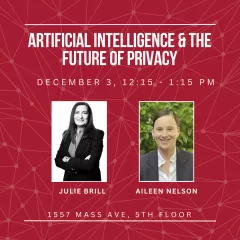
Artificial Intelligence and The Future of Privacy
A Conversation with Microsoft Chief Privacy Officer and Former FTC Commissioner, Julie Brill
Artificial intelligence (AI) applications are inherently data-intensive, requiring substantial information as input while sometimes producing outputs with significant privacy implications. The widespread adoption of AI tools prompts critical questions about the use of private data during the development and deployment of these transformative technologies. Additionally, new challenges arise at the intersection of intellectual property and privacy, as both fields are evolving rapidly in response to technological and market innovations in generative AI.
Modern AI systems introduce complex questions that may fall outside the scope of existing self-regulatory frameworks or traditional statutory laws. In the U.S., states are actively innovating and intervening to address digital privacy concerns. In this conversation, Microsoft Chief Privacy Officer Julie Brill and Harvard Law School Visiting Professor Aileen Nielsen explore the current landscape of privacy regulation in the United States and worldwide. They also discuss emerging legislative and regulatory trends as policymakers grapple with the governance of AI.
Sponsored by the Orrick Fund for the Colloquium on Cybersecurity/Cyberlaw.
Participant Biographies
Julie Brill serves as Microsoft’s Chief Privacy Officer and Corporate Vice President of Global Privacy, Safety, and Regulatory Affairs. She leads the company’s efforts in the tech policy, regulatory, and legal issues that underpin the world’s digital transformation.
Prior to her role at Microsoft, Brill served for six years as a Commissioner of the U.S. Federal Trade Commission (FTC). As Commissioner, she worked tirelessly on issues of critical importance to consumers, including privacy, fair advertising practices, fighting financial fraud, and fair competition.
Aileen Nielsen is a Visiting Assistant Professor at Harvard Law School, where she teaches privacy law and torts. Her research focuses on the interplay of law and technology, drawing on empirical methods and private law topics. She has written two trade books on machine learning and has also worked in industry as a data scientist.
You might also like
- communityThe apocalypse that wasn’t

